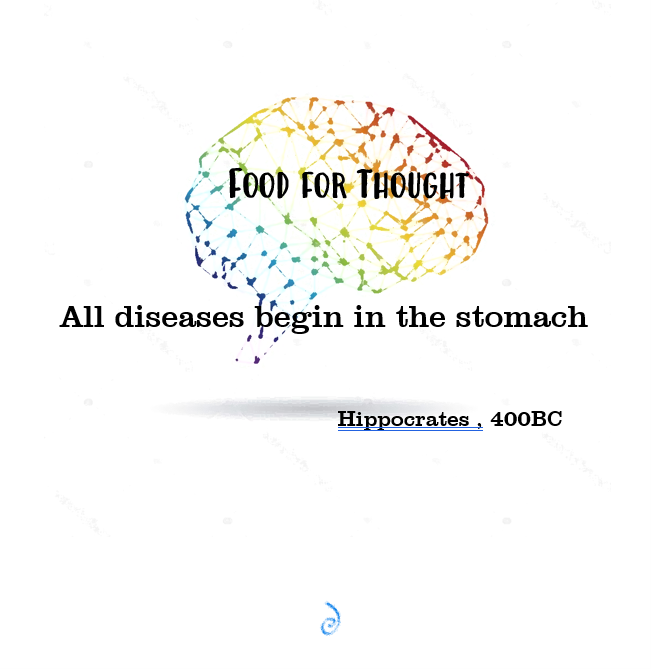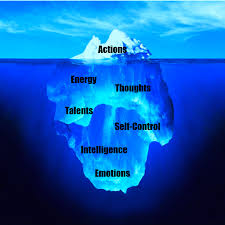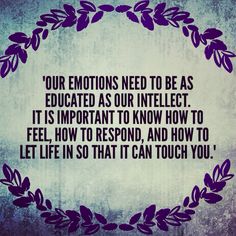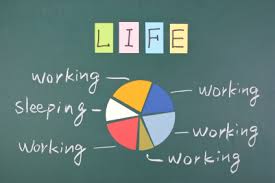Food for Thought





Have you ever questioned why at times negative thoughts flood your mind and how could you possibly turn such thoughts into positive ones ? Have you ever noticed the impact of how you think on what your decision or choice is when faced with an important dilemma ?
There are many questions but the fact is that our thoughts govern what we do and our responses to life , and in such occasions emotional intelligence may be indeed a plus .
Traditionally , people understood intelligence as the cognitive or mental capacity of a person , and the means employed to measure it is the well known IQ ( intelligence quotient ) test . In 1983 however , in his book “Fames of Mind” , developmental psychologist Howard Gardner proposed the theory of multiple intelligencies . Thus , instead of defining intelligence as a single logical ability , we should rather see it as a set of several clusters of skills – to date , in number of nine .
The list includes :
• Naturalist intelligence ( “nature smart” )
• Musical intelligence ( “musical smart “ )
• Logical-mathematical intelligence ( “number /reasoning smart” )
• Interpersonal intelligence ( “people smart” )
• Bodily-kinesthetic intelligence ( “body smart” )
• Linguistic intelligence ( “word smart” )
• Intrapersonal intelligence ( “self smart” )
• Spatial intelligence ( “picture smart” )
• Existential intelligence ( “morality smart” )
With the international launch of the book “Emotional Intelligence” in 1995 , psychologist and science journalist Daniel Goleman popularized this kind of intelligence , normally defined as the sentimental capacity of the mind , or the ability to identify , assess and control emotions .
Thus , according to Goleman , emotional intelligence has the following aspects :
1. Knowing our emotions
2. Managing our emotions
3. Recognizing emotions in others
4. Managing relationships with others
5. Motivating ourselves to achieve our goals
All these aspects are important because we always need to decipher and manage emotions
.
Emotional intelligence ( EQ or EI ) is not merely related to decision making , and currently it starts becoming maybe even more important than the IQ . Studies showed that , while the job a person gets after graduating might reflect the actual IQ , how far he/she advances in that job bears little relationship to it and sometimes not even related to that person’s grades in school . Rather , that person’s success is related to the EQ . Our success and happiness in life are more closely associated with EQ than with any other form of intelligence .
Emotional intelligence begins to develop in the earliest years as all the small exchanges children have with their parents , teachers and with each other carry emotional messages . How important is then to start molding it as earliest possible .
A variety of scientific studies have shown that increasing a person’s EQ will prevent or treat depression , phobias , obsessive-compulsive disorder , post-traumatic stress disorder , anorexia , bulimia and various addictions . Enhancing EQ is even more important in individuals who don’t have any addiction or a specific disease , as it promotes a happier life , the individuals getting to think more clearly and communicate more effectively .
Over the past decade , researchers had done extensive studies on the factors that influence EQ and found that genetic makeup , childhood experiences and current level of emotional support all play an important role .
It was shown as well that a plant-based diet is associated with healthier mood states in both men and women , and switching to a vegetarian diet will reduce the levels of stress , anxiety and depression , apparently because the plant foods don’t contain arachidonic acid known as an inflammatory fat present largely in meat and fish .
The activities we are doing as well have a very big impact on our IQ and EQ . The more entertainment television watched , the lower the creativity and one’s grades , resulting in addition and a lack of emotional control – that might lead even to the increase of violent and sexual crimes . Entertainment Internet , videos and video games are shown to have adverse effects .
The most important influence on EQ however is what we believe . Our beliefs – meaning , our evaluations of the events , the way we think about problems , our silent self-talk – in a large measure shape our emotions . Thus , our beliefs have much more to do with how we feel than what is actually happening in our lives .

It is not only with the Holidays or special occasions that we should consider gathering as family for meals . The benefits of such an old tradition in every culture of this World , can not be denied and can be seen in many areas of the general health and well-being .
Give it a try ! You won’t regret !
It’s only 20 mins of the long 24 hours to experience the blessings !

Altruism – often translated as well as selflessness , or serving others – has been shown to increase the size of amygdala , the part of the brain that reacts to fear and pleasure .
Research showed that amygdala may be larger and more responsive in altruists
Adrian’s wife checked his husband’s suitcase before they left on a much needed two-week vacation – but she wasn’t looking to see whether he’d packed enough clothes . The reason was instead the fact that Adrian was addicted to his job , and she was searching for the work papers that he often brought on these trips . However , she never found the stack of his company’s financial statements hidden in a pair of jeans .
Anne’s new business venture was a booming success . For sure , it took all of her free time to get things rolling . After five years of putting in 60 to 80 hours a week , she struck gold , and now she really can’t slow down . She even keeps her smartphone by her bedside so she can answer contacts in the middle of the night ! She promised herself a vacation a couple of years ago , unfortunately , it never happened . Her friends try to warn her that someday she’ll crash and burn .
Workaholism is one of the most difficult addictions for people to admit to . People who are obsessed with their work to the point that it damages their relationships and health are often in denial as our society mostly affirms the workaholics . Companies often reward the employees who overwork . The boss stands up at the annual Christmas party and brags about those employees who put in 60 to 80 hours a week . Work addiction can happen to anyone ( paid or unpaid ) who takes on too many responsibilities . And , the results for sure can be deadly .
What is an workacholic ?
Dictionary defines a workaholic as someone who is addicted to work . There is a difference between being “a hard worker” and being “addicted to your job” . Putting in some extra time to complete a project now and then is not the same as being chronically focused on work . Hard workers think about being at home with their families while staying late to finish a job . The work addicts instead are constantly thinking about their employment while being at home or with friends .
Sometimes , people will say they are workaholiscs to communicate how much they love their jobs . But people who are truly addicted to overwork , cross a sensitive line that sooner or later damages their health and relationships . They usually have deprived sleep and don’t exercise . They have children who hardly ever see them because they leave for work early and come home late . Or , they’re often on out-to-town business trips .
The Addiction Help Center defines the work addiction as a “process addiction” , which is defined as an addiction to certain behaviors or processes that can alter the mood and brain chemistry . “It becomes a problem when there is no balance and the boundaries are weak “
Mobile technology increased even more the blur between our jobs and personal time . It is making unplugging from work even more difficult for workaholics . The temptation to respond to bosses or clients who “need you” , often leaves spouses , children , or friends pushed aside . Telling your kids for example : “I’m doing this for you” , is again something which simply doesn’t cut it .
In some countries , work addiction is a cultural phenomenon . For example , many East Asian nations report high suicide rates among exhausted laborers who are extremely devoted to their jobs . The Japanese have even coined a special word for work addiction – “karoshi” , which literally means “death from overwork” .
In the article “Working to death in China” , published in “The Diplomat” , Charmika Monet states that an estimated 600000 people die every year in China due to work-related stress and its effects . China has become the nation with the highest incidence of death from overwork .
Research showed that the manual laborers working long hours are much less likely to die from strenuous work . The deadly pressure is almost completely among those with jobs that require mostly mental activity .
The payoff to putting in overtime has however its limits . It isn’t as simple as working more and getting paid more . Studies instead , have revealed that productivity begins to decline after a 50-hour workweek . Health risks climb as well , and the work relationships begin to break down . Even people who made more money have less time for leisure and relaxation .

Am I a workaholic ?
Like many of the addictions , it is difficult for workaholics to see their damaging dependency on work in order to feel good . It is hard to admit your problem when clients send “Thank-you” notes and the employers pat you on the back , even though in reality your personal life is falling apart . An inferiority complex can compel someone to search for value in the work , or from the employers , at the expense of healthy living . The workaholics can even become addicted to the adrenaline rush of putting in crazy hours or trying to meet unrealistic deadlines .
The author of the “Workaholics : The Respectable Addicts “ , Barbara Killinger ( who is as well a clinical psychologist ) , divides work addicts into three groups : controllers , pleasers , and narcissistic controllers .
The individuals in the first category think that everything has to be done their way .
The individuals from the second category want to make everyone else happy .
However , the third category is the most damaging – the narcissistic controllers being essentially shutting off the feelings over how their work habits negatively affect others .
Listening to your loved ones or your doctor can help you very much recognizing the symptoms of the overwork . Being in tune with your body can also reveal that your stress-related illnesses come with work addiction . Are you by chance feeling tense , tired , or worn down ? Then , it’s time to think ! Workaholics often die from heart attacks or strokes and the chronic depression as well is prevalent among the work addicts .
God’s solution to work addiction
If you happen however to believe in God , remember that He has a solution to this problem , too .
God knew that the human beings need time for rest , thus He created a way for them to find it . Built into the heart of the Ten Commandments , the fourth one is an antidote to the frenzied lives of the people who find it difficult to stop and it is called Sabbath .
The answer to workaholism is not to completely stop working but to live with balance . It is about learning when to work and when to stop . God’s gift of the Sabbath is especially beneficial to those who are addicted to work .
From the Bible we learn that God spent six days creating our world , and then He rested . “On the seventh d ay God ended His work which He had done , and He rested on the seventh day from all His work which He had done . Then God blessed the seventh day and sanctified it , because in it he rested from all His work which God had created and made “ ( Genesis 2:2-3 NKJV )
Have you ever wonder , why would an all-powerful God need to stop working ? His rest wasn’t for physical refreshment . It was instead an opportunity to connect with His creation . God has left us an example , yet , many people now live as if their work would be more important than the Creator’s , the One who made us and knows what is best for us .
The Sabbath is more than only a good advice , and the fourth commandment is specifically addressing the issue of work .”Remember the Sabbath day to keep it holy . Six days you shall labor and do all your work , but the seventh day is the Sabbath of the Lord you God . In it you shall do no work “ ( Exodus 20:8-10 NKJV )
Thus , stopping form our regular work is not only a way to acknowledge God as the Creator , but also to remind us that we are the created . The Sabbath tells us that we are not God . It sets our priorities straight and establishes the healthy boundaries that keep work and worship in balance . And , in case we are inclined to forget , this Sabbath commandment begins with the word “Remember” !
Keeping the Sabbath acknowledges that a Higher Power determines our lives and gives us value . Our significance doesn’t stay in our work . Our security is not based on our income . We exist because we were created and we stop our work to remember that we are loved .
Diane Fassel , the author of “Working Ourselves to Death” , points out that even if workaholics won the lottery , they would still be addicted to their work , because the driving force behind the addiction is never the money . It is instead the enormous amount of anxiety and unresolved psychological issues . She writes , “The underlying belief is that if I weren’t continually active , I’d have no right to exist . Like alcoholism , it’s a disease of the soul , a spiritual disease.”
In this sense , God’s cure for workaholism isn’t a new app for our electronic devices , but the Sabbath . Stopping our regular work every seventh day interrupts our obsession to focus on what we can accomplish and makes us remember what God has accomplished . Sabbath helps us admit that without God our lives are out of control . We cannot live sanely unless we connect to a Higher Power – a loving Creator who has a longing for our companionship and our worship .
Maurice was a true workaholic . He was making good money , but his wife was ready to leave him . His boss loved him , but his kids hardly knew their daddy . He felt chronically depressed and threw himself even harder into his job in order to cover the emotional pain and empty feeling that nagged his constantly .
Then , the most wonderful event took place in his life : Maurice lost his job . At first , he felt even more depressed , but it was a turning point . It gave him time to reflect on his priorities . Thus , when his wife suggested to attend a series of meeting about Bible , he agreed . During that seminar he was surprised hearing the presenter introducing the importance of Sabbath , as he assumed it was simply something only for Jews . But then , he read the statement “The Sabbath was made for man , not man for the Sabbath” which make him think more about the seventh day . By honoring God through keeping the Sabbath , Maurice not only put God in charge of his life but he was as well reminded that his value as a person was not in how much money he made .
Workaholism , like any other addictions , is a coping strategy that doesn’t work . It promises relief from underlying emotional issues , but never deliver . God’s plan instead , is the perfect solution for a healthy , balanced life , even for the work addicts . And it delivers !
Are you a workaholic ?
How can you tell whether you are simply a hard worker , or you are addicted to your work ? The following simple test created by the researchers from the Department of Psychological Science at the University or Bergen , Norway , will help you find out :
If you answered with “Often” or “Always” to any of these points , you may be a workaholic .
The research also revealed that about 10 percent of the average population from countries around the world is addicted to work .

All of us are conditioned even since from a very young age to obey and say “Yes” , but psychologists nowadays warn that this can be detrimental to our health later on in adulthood .
Let’s dive into the “NO” zone now !
When is the last time when you answered “No” ?! Have you ever felt that if you say “No” to your family or friends they might think that you are selfish , have a negative attitude , aren’t being nice , or don’t know how to be a good team player ?
For many people , saying “No” can feel like an unacceptable response . “May I borrow some money ?” “Yes” . “Can you coordinate the school program again ? You’ve done such a great job during the past five years !” “Yes.” “May I borrow your car ? I may look like a terrible driver , but that is only with my car.” “Yes.”
However , when it’s used appropriately , saying “No” means something . It’s a clear statement that you – as a separate and unique individual – have personal limits , be they ethical , social , spiritual , sexual , financial , physical , mental , emotional , or professional . These boundaries help you to connect with others and stay safe at the same time .
When you say “No” , you affirm your personal limits clearly and positively . In one setting your statement may announce your integrity , while in another it may shield you from being exploited . If you can never say “No” to anything , it’s possible that you are being controlled by either expectations , family scripts , perceived rules , or threats – whether verbalized or not .
In adulthood , you can never genuinely say “Yes” until you can appropriately say “No” . Negativity is as different from a healthy and functional ability to say “No” as night and day . Negativity is an undesirable mind-set . Think of it as a whining approach to life , a way to avoid making a decision but then complaining about the outcome .
Negativity looks for what is undesirable or focuses on what did not or cannot happen . Sometimes it reflects the person’s attempt to feel better about himself or herself by finding fault with the environment or with the behavior of others . In the end it will sap your energy , diminish the enthusiasm of others , and pretty much ensure that you will never be pleased .
You have however the power to say “No” . It is built in every human brain . However , most of the times many people relinquish their power on others . Individuals ( especially the women ) often are controlled by the word “love” . The more they want love , the more likely they are to give up their power of saying “No” .
Think of the ability of saying “No” as an insurance policy – when prevention and planning are usually so much better than cure .
There are several steps that might help you in the process .
Step 1 Say “No” to yourself
You can learn how to say “No” by practicing it first on yourself . Use the same language with yourself . begin at home or when you are doing grocery shopping . Think of two options at a time , and then create opportunities to practice .
Whenever you have a decision to make , ask yourself for example “Do I want to wear jeans or slacks ?” “Do I want asparagus , or broccoli ?” Give yourself always two options , and then answer “No” to one and “Yes” to the other . Make a game of it ( which gradually will be turned into a routine ) . The more fun you have , the better . With time , you’ll become more comfortable using the language with yourself .
Step 2 Use it appropriately with others
Simply put , if you acquiesce to all the requests , you will fail to accomplish your own goals . When the answer needs to be “No” , try to deliver it in the same manner you would want to receive it . Sometimes , you can respond without actually using the word “No” and add it only if your answer appears not to be heard , understood , or accepted .
Some people act hurt or angry when you happen to say “No” . That is because most of the brains want a “Yes” rather than a “No” , so they are having difficulty hearing it . And if the individual perceives that he or she is valuable only when others acquiesce , it can make him or her – and you as well- feel downright uncomfortable .
Step 3 If they won’t take “No” for an answer
Sometimes people keep pushing for what they want , especially when they themselves have poor personal boundaries or any self-esteem issues . If they suggest that you should change your schedule , a simple “No” is sufficient . But if they want you to disclose all the details and reasons , simply repeat calmly that you already have an appointment
The wise advice of a parent to his son or daughter might sound like this : “Unless you’re being cross-examined in Court , you don’t have to answer every question you are asked simply because someone asked it . Live the eleventh commandment , that which reads : “Thou shalt not explain.” “ ( It’s worth taking it into account , but , of course , don’t use it first with your parents , or you’re going to hear that at home you are allowed to learn strategy , but applying it you should grow up and left home first )
Learning how to say “No” is a continual balancing act which involves : evaluating , making choices , following through on your decisions , being able to negotiate , being willing and able to alter your decision if that appears to be the wiser course , and sometimes , just agreeing to disagree .
There are times when you absolutely must take care of yourself and your schedule in order to be able to accomplish your personal goals . At other times , you may prefer a quiet time at home , but your concern for others outweighs that desire . For example , you may choose to fix dinner and take it to a family who has just brought their child home from the hospital , or help a friend move , or choose to read to a vision-impaired shut-in , or spend time with one who has suffered bereavement . Maturity involves being able to find your voice to say “No” as well as to say “Yes”
If your answer is “No” , you might then want to reconsider . Plan ahead , practice , and remind yourself as often as possible that “No” is as well a legitimate response . In some situations , it can be even life saving . And , following that wise advice just mentioned a while ago , not offering an explanation can be all right too !

The words “Options” and “Choices” clearly imply decision making – a key developmental task underlies much of a person’s success in life . The wise parent , caregiver should offer choices very early in life and as often as possible .
Giving only two choices at a time is preferred , since the brain has only two cerebral hemispheres . Almost any two choices will work as long as they’re safe and healthy . This gives the child occasions to practice making choices by saying “No” to one and “Yes” to the other . Here are some examples . :
When the child makes a choice , be sure you follow that choice so he or she learns that there are consequences to making choices .
Sometimes , a child who wants desperately to please or who has learned that it’s unsafe to verbalize personal wishes , will say “I don’t care . You choose” . That is a great opportunity to reply with : “You’re the only person who will be with you for your entire life. It’s important that you learn to take good care of yourself by knowing how to make choices You’re old enough to start now .” and make him or her understand for life this lesson .
It takes courage to offer choices , especially in the short term . At times it may be faster , easier and even stressfree to just tell the child what to do , but that is not helping him or her in the long run ( unless it’s imperative that you , as a parent of caregiver , make the choice deliberately in order to protect the child from an unwise one )

A new school year is about to start , and we all are students in the lifestyle area of study – no matter if we are young in age , or , still young in the heart .
How are we going to know if it would a good one or not ? Is it our aim to make the best of this new year ?
First of all , we are going to need a lot of energy in order to set up for this journey . Anyone guess what is the energy about ?! Yeap , it comes from foods ! Not only how much we eat , but more importantly the quality of the fuel we’re taking in .
We are going to learn as well many new concepts – and maybe changes of some of our paradigms will be necessary here and there .
We are certainly going to face many evaluations on the way – to analyze our progress and help us keep up on the track .
And , for sure , it depends only on us if we want to make of this year the most perfect of all in terms of health .
For those of us who maybe forgot the grading system , I will take few minutes now to have a very brief review . Starting to the higher standards we’re aiming for , here’s the A group : A+ is 100 , A is 90 , and A- is 85 …
Then , the B section : B+ is 80 , B is 70 , and B- is 65 .
Then , comes the C section ! ( not the one you maybe are thinking about ! ha ) : C+ is 60 , C is 50 , C- is 45
( I have to admit that this looks quite scary – you’re about to surely fail if getting stuck for too long in the C section ! hmmm But , don’t worry , there’s always grace given abundantly to redo some of your classes , retake some of your tests and increase your grade ! )
The D section : D+ is 40 , D is 30 , D- is 25
And , the lowest standard section : F+ is 20 , and F is 10 …. ( see , there is no F- ! hmm )
So , you might ask now : What’s the point anyway , and what’s the link of all these to the lifestyle class – especially in terms of diet – I was mentioning about at the beginning ?
Make the following chart your perfect guide in terms of food choices while aiming for perfect health and wellbeing , and it’s guaranteed that this year will be a highly performance one , an A+ year !
Keep it Up !
